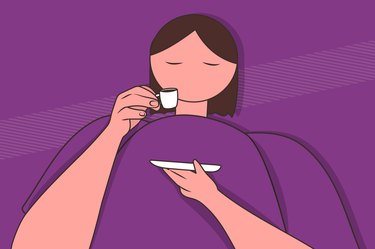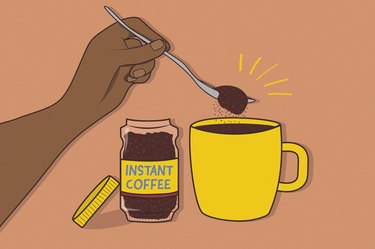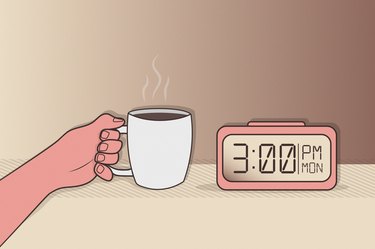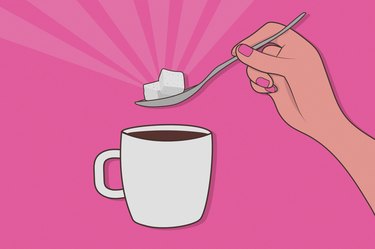
From its foamy top layer to its concentrated flavor and syrupy body, espresso is in a league of its own. But aside from its signature taste, espresso — an unfiltered method of brewing coffee that involves using high water pressure and finely ground beans — is best known for its energizing effects.
So, if you start your day with an espresso shot and rely on the caffeine rush to get you going, you might be bummed to hear that your favorite brew could be bad for your health (more specifically, your heart and your gut).
Video of the Day
Video of the Day
Here, Bonnie Taub-Dix, RDN, author of Read It Before You Eat It — Taking You from Label to Table, helps us sift through the controversy, including whether espresso is bad for you or if it comes with some benefits.
(Possible) Cons of Espresso
1. It May Hinder Heart Health
Some studies have shown that unfiltered coffee like espresso may have a negative effect on heart health, Taub-Dix says.
An April 2020 study in the European Journal of Preventive Cardiology observed that drinking unfiltered coffee (like espresso) is linked to a higher chance of dying from heart disease, ischemic heart disease or stroke.
But what's the connection between heart concerns and espresso?
For one, "studies have shown that a substance in unfiltered coffee like espresso might increase LDL (bad) cholesterol," Taub-Dix says. Found in coffee beans, these oily substances that she's referring to — called diterpenes — usually get strained in filtered coffee. But when you forego the filtering process for brews like espresso, many diterpenes stick around your shot glass.
In fact, one cup of unfiltered coffee clocks 30 times more diterpenes than the same amount of a filtered brew, per Harvard Health Publishing.
Problem is, high cholesterol levels are linked to a greater risk for heart disease and stroke, two top causes of death in the United States, according to the Centers for Disease Control and Prevention (CDC).
What's more, the high caffeine content in espresso may hinder heart health too. That's because caffeine acts as a stimulant, which could adversely affect blood pressure, Taub-Dix says. Too much caffeine may raise your blood pressure (and trigger nervousness, heart palpitations, the jitters and insomnia), according to Harvard Health Publishing.
For most adults, up to 400 milligrams of caffeine daily (that's about 4 cups of coffee) is safe to sip, according to the FDA. But keep in mind: Espresso touts more caffeine, ounce for ounce, than an average cup of joe. "Espresso contains 63 milligrams of caffeine in 1 ounce (the amount in one shot) while regular coffee provides 12 to 16 milligrams of caffeine in every ounce," Taub-Dix says.
So, if you're enjoying espresso in excessive amounts (or any caffeinated beverage for that matter), it might be problematic for your blood pressure.
2. It May Cause Gastrointestinal Issues
Always get an upset stomach after sipping your shot of espresso? You can likely blame the high caffeine content for that, Taub-Dix says.
Here's why: Caffeine stimulates your GI tract, so, for some people, a highly-concentrated amount (like a shot of espresso) can cause gastrointestinal distress and exacerbate symptoms of gastroesophageal reflux disease (GERD) or irritable bowel syndrome (IBS), Taub-Dix says.
Caffeine increases stomach acids, which makes the acid reflux that occurs in GERD more probable, according to the Cleveland Clinic.
In addition, caffeine also speeds up contractions in your digestive tract, per the Cleveland Clinic. That means it can raise your risk of developing diarrhea, especially for people with IBS, according to Johns Hopkins Medicine.
Tip
While espresso has more caffeine per ounce than regular coffee, the latter comes in larger serving sizes, and many people drink several cups. So, you might actually be consuming more caffeine (and running into some of the same health-related issues) if you overdo it on the regular brew, Taub-Dix points out.
(Possible) Pros of Espresso
1. It May Increase Cognitive Performance
"As with any other caffeinated beverage, for some people, espresso might help them feel more alert, aware and energetic," Taub-Dix says.
Here's why that happens: Caffeine stimulates the nervous system, according to the Cleveland Clinic, making you feel awake and alert. So a strong coffee, like an espresso, will likely give you a bigger brain boost.
Perhaps that's partly why caffeine can also magnify your memory skills. Matter of fact, a January 2014 study in Nature Neuroscience found that caffeine can improve memory consolidation (i.e., the process by which your brain transforms short-term memories into long-term ones) for up to 24 hours.
2. It May Enhance Your Exercise Routine
For some people, the energy supplied by a strong shot of caffeinated espresso can help amplify exercise ability, Taub-Dix says.
And there's some data to support this theory. A March 2019 review in the British Journal of Sports Medicine concluded that caffeine elevates exercise performance, increasing endurance, strength and power.
How to Drink Espresso Responsibly
If you're emphatic about espresso, you can still sip it safely. Simply follow these strategies:
1. Stick to One Shot
"When I think of espresso, I marvel at how people in Paris, for example, can sit at a cafe over one little shot of this coffee for hours," Taub-Dix says. "In this country, we tend to consume double shots of espresso in swimming pool-sized cups filled with other additions including syrups and sugar," she says.
And, unfortunately, these oversized servings aren't, well, serving you. As we know, excessive caffeine can cause health issues. And a surplus of sugar only supplies a slew of empty calories.
Moral of the story: Moderation is key. In fact, a moderate amount of caffeine seems to be the sweet spot for health, especially for your heart. For instance, a February 2021 Circulation: Heart Failure study found that having at least one cup of caffeinated coffee daily is linked to a lower probability of heart failure. And a July 2020 review article in the New England Journal of Medicine found that "moderate consumption of coffee or tea can be part of a healthy lifestyle."
"So sip slowly and appreciate the rich flavor and aroma of espresso instead of diluting it down in a giant vessel with lots of add-ons," Taub-Dix says.
2. Know Your Tolerance Level for Caffeine
"When it comes to consuming caffeine, you need to know yourself even more than your morning blend," Taub-Dix says. That's because everyone's response to the chemical will vary, and some people may be more sensitive to caffeine's effects than others, according to the Mayo Clinic.
This means you must heed your body and know your tolerance level. "One person might do just fine with, say, 400 milligrams of caffeine per day, but someone else may not even be able to tolerate 200 milligrams," Taub-Dix says.
For those sensitive to caffeine, even a smaller dose (think: one shot of espresso) may produce unpleasant side effects including restlessness and sleep problems, according to the Mayo Clinic.
3. Watch Your Cholesterol
If you're an espresso enthusiast, you might want to err on the side of caution and keep track of your cholesterol, per Harvard Health Publishing. Partner with your doctor who can monitor your LDL levels to make sure they don't rise to a dangerous degree.
So, Is Espresso Bad for You?
If you have a health condition (like high cholesterol, heart problems, GERD or IBS) and caffeine worsens your symptoms, you should probably scale back on your espresso shots.
But if you're fit as a fiddle and can tolerate an unfiltered brew, keep enjoying your espresso — in moderation — as a part of your morning ritual, Taub-Dix says.
- European Journal of Preventive Cardiology: “Coffee consumption and mortality from cardiovascular diseases and total mortality: Does the brewing method matter?”
- Harvard Health Publishing: “Pressed coffee is going mainstream — but should you drink it?”
- Harvard Health Publishing: “What’s the healthiest way to brew coffee?”
- British Journal of Sports Medicine: “Wake up and smell the coffee: caffeine supplementation and exercise performance-an umbrella review of 21 published meta-analyses”
- Circulation: Heart Failure: “Association Between Coffee Intake and Incident Heart Failure Risk”
- Cleveland Clinic: “Why Does Coffee Bother My Stomach?”
- Johns Hopkins Medicine: “5 Foods to Avoid if You Have IBS”
- Nature Neuroscience: “Post-study caffeine administration enhances memory consolidation in humans”
- Mayo Clinic: "Caffeine: How much is too much?"
- FDA: "Spilling the Beans: How Much Caffeine is Too Much?"
- Cleveland Clinic: "Caffeine: How to Hack It and How to Quit It"
- New England Journal of Medicine: "Coffee, Caffeine, and Health"



